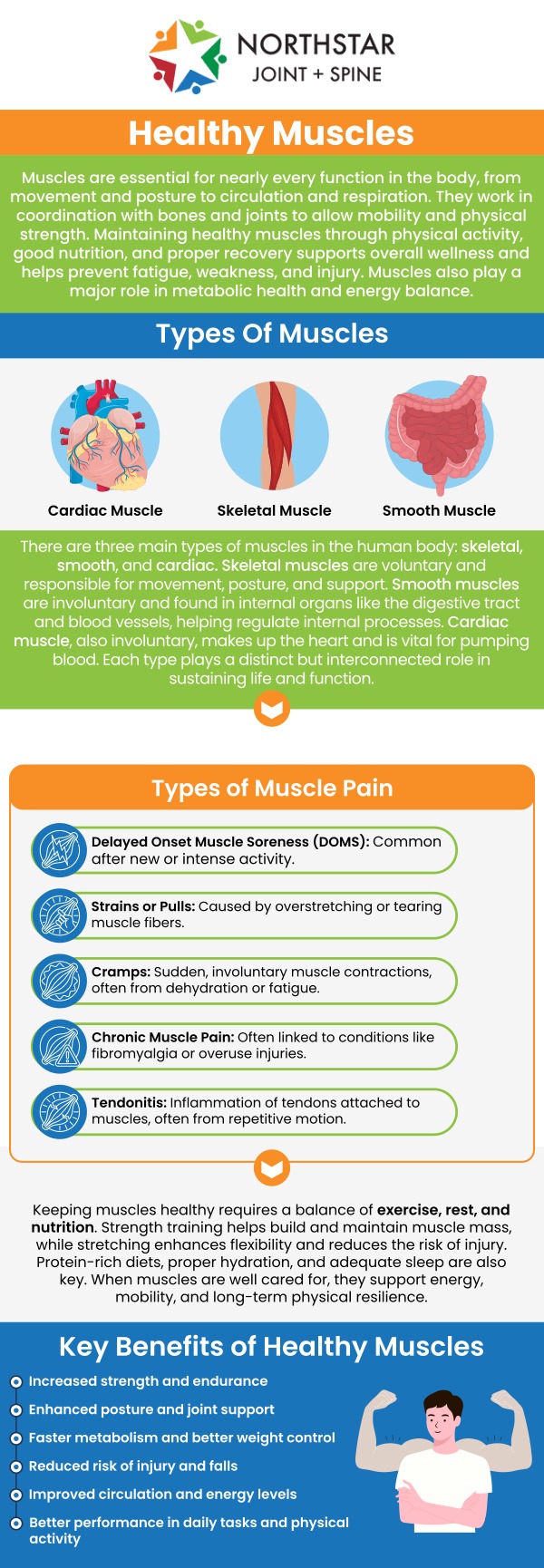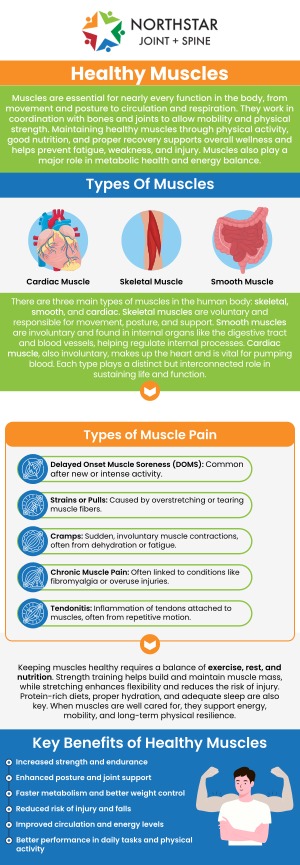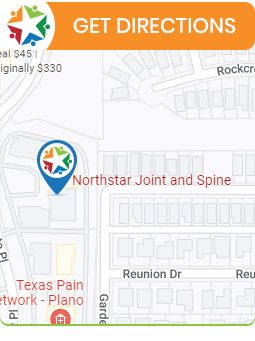Importance of Muscles in the Body
Muscles play a vital role in supporting the body, enabling movement, and maintaining posture. They are essential for daily activities, from lifting to walking, and help protect bones and joints from strain. Strengthening muscles through exercise can improve flexibility, reduce pain, and enhance overall well-being. For personalized care and muscle health, visit Northstar Joint and Spine, where Board Certified Dr. Robert J. Nocerini, MD, and his team are dedicated to keeping your muscles strong and functioning well. For more information, contact us today or schedule an appointment online. We are conveniently located at 7704 San Jacinto Pl Suite #200 Plano, TX 75024.


Table of Contents:
What Are Muscles?
Why Are Muscles Important?
How Do Muscles Get Damaged?
How Should We Care for Our Muscles?
How Northstar Joint and Spine Can Help
Muscles are essential to the human body, enabling movement, supporting bodily functions, and contributing to overall health and well-being. From the simple actions of walking and standing to more complex movements involved in sports or lifting objects, muscles are responsible for nearly all physical activities. They work in harmony with bones, tendons, and joints to provide stability, mobility, and strength.
Muscles are specialized tissues in the body that have the ability to contract and relax, enabling movement. The human body has three types of muscles: skeletal muscles, smooth muscles, and cardiac muscles. Skeletal muscles are the most well-known type, as they are attached to the bones and are responsible for voluntary movements. These muscles work with the skeletal system to perform functions like walking, running, and lifting. Smooth muscles, found in the walls of internal organs such as the stomach and blood vessels, control involuntary movements, such as the movement of food through the digestive system. Cardiac muscle, located only in the heart, is responsible for pumping blood throughout the body and operates involuntarily as well.
Muscle tissue is composed of fibers, which are long, thin cells that contract when stimulated by electrical signals from the nervous system. This contraction generates force, which is used to move the body or perform specific tasks. Muscles can vary in size and function depending on their location and the role they play in the body’s overall movement and stability.
Muscles are integral to virtually every function of the body, both voluntary and involuntary. The most obvious role of muscles is in facilitating movement. Skeletal muscles allow us to walk, run, jump, and carry out activities of daily living. Without them, basic motions like standing, sitting, and even breathing would not be possible.
Muscles also play a key role in maintaining posture and stability. The muscles of the core, including the abdominals, back, and pelvic muscles, provide the necessary support to keep the body upright. They help stabilize the spine, protect the internal organs, and prevent falls. In addition, muscles work with the bones and joints to create a system of levers that allow us to manipulate objects, carry weight, and perform more complex movements.
Beyond movement and stability, muscles contribute to the body’s metabolic processes. Muscle tissue is an active part of the body’s energy use. Even when at rest, muscles burn calories to maintain function. Having a higher muscle mass helps increase the body’s resting metabolic rate, which can aid in weight management. In addition, muscles assist in regulating blood circulation by helping to pump blood through veins back to the heart. The contraction of skeletal muscles contributes to venous return, which is the process of returning blood to the heart after it has circulated through the body.
Muscles are also involved in thermogenesis, the process of generating heat to maintain the body’s temperature. When the body is cold, muscles may involuntarily contract, such as in shivering, to generate heat and help regulate body temperature.
Muscles can become damaged for a variety of reasons, from overuse to underlying medical conditions. The most common way muscles get damaged is through excessive strain or overexertion. When muscles are pushed beyond their capacity, fibers can tear, leading to muscle soreness, discomfort, and in some cases, more serious conditions. These strains often occur during physical activity, particularly when the body is not properly warmed up or when an individual tries to lift more weight than their muscles can handle. Overuse of muscles, such as repetitive movements during work or sports, can lead to fatigue and microscopic damage to muscle fibers. While the muscles can typically repair themselves over time, repeated overuse can result in chronic muscle discomfort or weakness.
Another common cause of muscle damage is poor posture or improper body mechanics. Muscles that are held in an unnatural position for prolonged periods can become strained, leading to tightness, discomfort, or even longer-term damage. For example, sitting for long periods with poor posture can cause the muscles in the back, shoulders, and neck to become stiff and fatigued, contributing to discomfort and reduced mobility.
Certain health conditions can also impact muscle health. For example, diseases like muscular dystrophy and fibromyalgia can weaken muscles, reduce flexibility, and cause chronic pain. Inflammatory conditions can also affect muscles, causing them to become inflamed and painful. Additionally, older adults may experience muscle loss due to age-related changes in muscle mass and strength, a condition known as sarcopenia. Sarcopenia can significantly affect mobility and overall health, making it harder for individuals to maintain an active lifestyle.
Maintaining muscle health is essential for overall well-being and quality of life. Regular exercise, proper nutrition, and adequate rest are the cornerstones of muscle care. Exercise is vital for strengthening muscles, increasing flexibility, and improving endurance. Resistance training, which involves lifting weights or using resistance bands, is particularly effective at building muscle mass and improving muscle function. Cardiovascular exercises, such as walking, running, or cycling, help improve overall muscle endurance and cardiovascular health. Stretching exercises like yoga or Pilates can also help improve flexibility, reducing the risk of muscle stiffness.
In addition to regular exercise, proper nutrition is key to muscle health. Protein is an essential nutrient for building and repairing muscle tissue, and it should be included in the diet daily. Foods such as lean meats, fish, eggs, beans, and nuts are excellent sources of protein. Ensuring an adequate intake of vitamins and minerals, especially vitamin D and calcium, is also important for maintaining strong muscles and bones. Vitamin D helps with calcium absorption, and both are critical for muscle function and bone health.
Rest and recovery are equally important for muscle care. After intense physical activity, muscles need time to recover and repair. Overtraining without sufficient rest can lead to muscle fatigue and damage from overuse. Adequate sleep is essential for muscle repair, as the body does much of its healing during rest. Hydration is another key factor in muscle recovery, as water helps to transport nutrients to muscle tissues and flush out waste products.
At Northstar Joint and Spine, led by Board Certified Dr. Robert J. Nocerini, MD, we are dedicated to helping you maintain and improve your muscle health through a comprehensive approach. Whether you are dealing with muscle discomfort, weakness, or general pain, our team offers personalized care plans to support your needs. We provide a range of treatments designed to restore muscle function, improve strength, and alleviate discomfort.
We use advanced tools to assess muscle health and identify any underlying issues that may be affecting your muscles. Based on this evaluation, Dr. Nocerini and our team create a customized treatment plan to address your specific condition. This may include physical therapy, targeted exercises, or therapeutic interventions designed to improve muscle strength and reduce pain.
At Northstar Joint and Spine, we understand that every individual’s muscle health needs are unique. Whether you are looking to recover from muscle discomfort or want to enhance your overall muscle strength and function, we are here to provide expert guidance and care. With our personalized treatments and compassionate care, we help you regain mobility, improve strength, and enhance your overall quality of life. For more information, contact us today or schedule an appointment online. We are conveniently located at 7704 San Jacinto Pl Suite #200 Plano, TX 75024. We serve patients from Plano TX, Willow Bend TX, Frisco TX, Allen TX, Addison TX, North Dallas TX, and surrounding areas.

Check Out Our 5 Star Reviews


Additional Services You May Need
▸ Back Pain
▸ Shoulder Pain
▸ Chronic Pain
▸ Epidural Steroid Injections
▸ Spinal Cord Stimulation
▸ Viscosupplementation
▸ Genicular Nerve Blocks
▸ Facet Injections
▸ Joint Injections
▸ Sacroiliac Joint Injections
▸ Lumbar and Cervical
▸ Facet Medial Branch Blocks
▸ Diagnostic Nerve Blocks
▸ Medication Management
▸ Neck Pain Doctor
▸ Diabetic Peripheral Neuropathy
▸ Headaches
▸ Suboxone
▸ Botox for Migraines
▸ Peripheral Nerve Stimulation
▸ Spine
▸ Joints
▸ Muscles
▸ Bones

Additional Services You May Need
▸ Back Pain
▸ Shoulder Pain
▸ Chronic Pain
▸ Epidural Steroid Injections
▸ Spinal Cord Stimulation
▸ Viscosupplementation
▸ Genicular Nerve Blocks
▸ Facet Injections
▸ Joint Injections
▸ Sacroiliac Joint Injections
▸ Lumbar and Cervical
▸ Facet Medial Branch Blocks
▸ Diagnostic Nerve Blocks
▸ Medication Management
▸ Neck Pain Doctor
▸ Diabetic Peripheral Neuropathy
▸ Headaches
▸ Suboxone
▸ Botox for Migraines
▸ Peripheral Nerve Stimulation
▸ Spine
▸ Joints
▸ Muscles
▸ Bones






